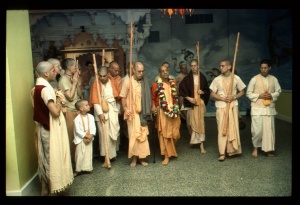SB 2.9.7: Difference between revisions
No edit summary |
(Vanibot #0054 edit - transform synonyms into clickable links, which search similar occurrences) |
||
| Line 23: | Line 23: | ||
<div class="synonyms"> | <div class="synonyms"> | ||
''niśamya'' | ''[//vanipedia.org/wiki/Special:VaniSearch?s=niśamya&tab=syno_o&ds=1 niśamya]'' — after hearing; ''[//vanipedia.org/wiki/Special:VaniSearch?s=tat&tab=syno_o&ds=1 tat]'' — that; ''[//vanipedia.org/wiki/Special:VaniSearch?s=vaktṛ&tab=syno_o&ds=1 vaktṛ]'' — the speaker; ''[//vanipedia.org/wiki/Special:VaniSearch?s=didṛkṣayā&tab=syno_o&ds=1 didṛkṣayā]'' — just to find out who spoke; ''[//vanipedia.org/wiki/Special:VaniSearch?s=diśaḥ&tab=syno_o&ds=1 diśaḥ]'' — all sides; ''[//vanipedia.org/wiki/Special:VaniSearch?s=vilokya&tab=syno_o&ds=1 vilokya]'' — seeing; ''[//vanipedia.org/wiki/Special:VaniSearch?s=tatra&tab=syno_o&ds=1 tatra]'' — there; ''[//vanipedia.org/wiki/Special:VaniSearch?s=anyat&tab=syno_o&ds=1 anyat]'' — any other; ''[//vanipedia.org/wiki/Special:VaniSearch?s=apaśyamānaḥ&tab=syno_o&ds=1 apaśyamānaḥ]'' — not to be found; ''[//vanipedia.org/wiki/Special:VaniSearch?s=svadhiṣṇyam&tab=syno_o&ds=1 svadhiṣṇyam]'' — on his lotus seat; ''[//vanipedia.org/wiki/Special:VaniSearch?s=āsthāya&tab=syno_o&ds=1 āsthāya]'' — sit down; ''[//vanipedia.org/wiki/Special:VaniSearch?s=vimṛśya&tab=syno_o&ds=1 vimṛśya]'' — thinking; ''[//vanipedia.org/wiki/Special:VaniSearch?s=tat&tab=syno_o&ds=1 tat]'' — it; ''[//vanipedia.org/wiki/Special:VaniSearch?s=hitam&tab=syno_o&ds=1 hitam]'' — welfare; ''[//vanipedia.org/wiki/Special:VaniSearch?s=tapasi&tab=syno_o&ds=1 tapasi]'' — in penance; ''[//vanipedia.org/wiki/Special:VaniSearch?s=upādiṣṭaḥ&tab=syno_o&ds=1 upādiṣṭaḥ]'' — as he was instructed; ''[//vanipedia.org/wiki/Special:VaniSearch?s=iva&tab=syno_o&ds=1 iva]'' — in pursuance of; ''[//vanipedia.org/wiki/Special:VaniSearch?s=ādadhe&tab=syno_o&ds=1 ādadhe]'' — gave; ''[//vanipedia.org/wiki/Special:VaniSearch?s=manaḥ&tab=syno_o&ds=1 manaḥ]'' — attention. | ||
</div> | </div> | ||
Latest revision as of 21:22, 17 February 2024

A.C. Bhaktivedanta Swami Prabhupada
TEXT 7
- niśamya tad-vaktṛ-didṛkṣayā diśo
- vilokya tatrānyad apaśyamānaḥ
- svadhiṣṇyam āsthāya vimṛśya tad-dhitaṁ
- tapasy upādiṣṭa ivādadhe manaḥ
SYNONYMS
niśamya — after hearing; tat — that; vaktṛ — the speaker; didṛkṣayā — just to find out who spoke; diśaḥ — all sides; vilokya — seeing; tatra — there; anyat — any other; apaśyamānaḥ — not to be found; svadhiṣṇyam — on his lotus seat; āsthāya — sit down; vimṛśya — thinking; tat — it; hitam — welfare; tapasi — in penance; upādiṣṭaḥ — as he was instructed; iva — in pursuance of; ādadhe — gave; manaḥ — attention.
TRANSLATION
When he heard the sound, he tried to find the speaker, searching on all sides. But when he was unable to find anyone besides himself, he thought it wise to sit down on his lotus seat firmly and give his attention to the execution of penance, as he was instructed.
PURPORT
To achieve success in life, one should follow the example of Lord Brahmā, the first living creature in the beginning of creation. After being initiated by the Supreme Lord to execute tapasya, he was fixed in his determination to do it, and although he could not find anyone besides himself, he could rightly understand that the sound was transmitted by the Lord Himself. Brahmā was the only living being at that time because there was no other creation and none could be found there except himself. In the beginning of the First Canto, in the First Chapter, first verse, of the Śrīmad-Bhāgavatam, it has already been mentioned that Brahmā was initiated by the Lord from within. The Lord is within every living entity as the Supersoul, and He initiated Brahmā because Brahmā was willing to receive the initiation. The Lord can similarly initiate everyone who is inclined to have it.
As already stated, Brahmā is the original spiritual master for the universe, and since he was initiated by the Lord Himself, the message of Śrīmad-Bhāgavatam is coming down by disciplic succession, and in order to receive the real message of Śrīmad-Bhāgavatam one should approach the current link, or spiritual master, in the chain of disciplic succession. After being initiated by the proper spiritual master in that chain of succession, one should engage himself in the discharge of tapasya in the execution of devotional service. One should not, however, think himself on the level of Brahmā to be initiated directly by the Lord from inside because in the present age no one can be accepted to be as pure as Brahmā. The post of Brahmā to officiate in the creation of the universe is offered to the most pure living being, and unless one is so qualified one cannot expect to be treated like Brahmājī directly. But one can have the same facility through unalloyed devotees of the Lord, through scriptural instructions (as revealed in the Bhagavad-gītā and Śrīmad-Bhāgavatam especially), and also through the bona fide spiritual master available to the sincere soul. The Lord Himself appears as the spiritual master to a person who is sincere in heart about serving the Lord. Therefore the bona fide spiritual master who happens to meet the sincere devotee should be accepted as the most confidential and beloved representative of the Lord. If a person is posted under the guidance of such a bona fide spiritual master, it may be accepted without any doubt that the desiring person has achieved the grace of the Lord.